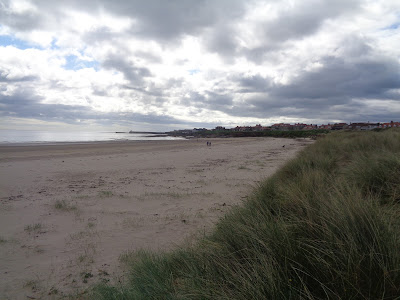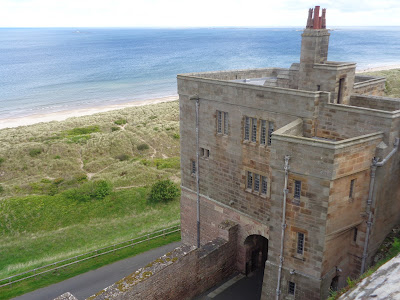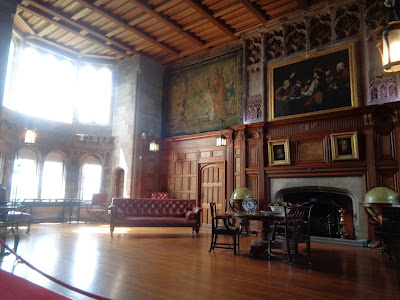 |
| with a zoom lens you can see the castle from Seahouses. |
I felt rather envious of the horse riders. That must be a fun place to ride.
The path out of Seahouses runs between the main coast road and North Sunderland Beach for a short while then veers to the right, away from the road. It then stays so close to the coastline you can choose whether to stay on the path or walk on the beach.
The weather in the area is known for being unpredictable but that day it seemed to be going from overcast to sunny every ten minutes.
 |
| Looking back toward Seahouses. What happened to the blue sky? |
A short rocky section separates North Sunderland Beach from Bamburgh Beach.
 |
Once past that we were once again on a long stretch of beautiful beach. And we had it all to ourselves!
 |
| Perfect timing for the sun to come out again. |
 |
| Is that a castle I see between those high sand dunes? |
The castle dates back 1400 years and has a varied history. In 993 the existing castle was ransacked by the Vikings but in the 11th century the Normans built a new castle on the site.
In 1464 during the War of the Roses, it became the first castle in England to be defeated by artillery after coming under cannon fire during a siege by the Yorkists.
In the 18th century, it was passed from the monarchy into private hands but the cost of upkeep meant the castle soon fell into ruin. Restoration work started in the 19th century but financial difficulties forced the castle's sale in 1894.
It was then bought by Lord William Armstrong, a pioneer in engineering and an environmentalist (his other home in Northumberland, Craigside was the first in the world to be lit by hydroelectric power) and while he died before the restoration was complete it has remained the private home of the Armstrong family ever since, although now parts of the castle are open to the public.
The sight of the castle on the dunes above the long sandy beach is fantastic.
The Armoury is open to the public and has an impressive range of weapons and armor.
And let's not forget the scullery. Lord Armstrong was apparently keen to take the drudgery out of his staff's work and so introduced an early dishwasher and a vacuum to make their lives easier.
And of course, no castle is complete without a dungeon:
All in all it was another great day on the Northumberland Coastal Path.
 |
| Approaching the castle from the south |
The sight of the castle on the dunes above the long sandy beach is fantastic.
It is well worth a visit. There's plenty to see both inside and outside.
 |
| The keep is the oldest surviving part of the castle |
 |
| View from the Keep |
The King's Hall was built on the site of the original Great Hall and features a magnificent wood beam ceiling.
Fourteen state rooms are also open to the public including:
 |
| The Cross Hall |
 |
| The Library/Billiards Room |
 |
| Each sink had a different purpose. |
The old stables have been turned into a cafe:
The village of Bamburgh is small and quaint, but offers a multitude of cafes and pubs along the main street. My favorite is the Copper Kettle Tea Rooms which does scrumptious scones with cream and jam, the perfect accompaniment to a pot of tea!
 |
| view of the village from the castle |
All in all it was another great day on the Northumberland Coastal Path.
I was a little sad I didn't have time to do the rest of the walk to Berwick, but it's something to look forward to for my next visit to England!
Mel writes contemporary fiction with a twist of mystery and suspense and the Detective Rigby series.
For more information about her books visit her website, or sign up for her newsletter.





.JPG)

No comments:
Post a Comment